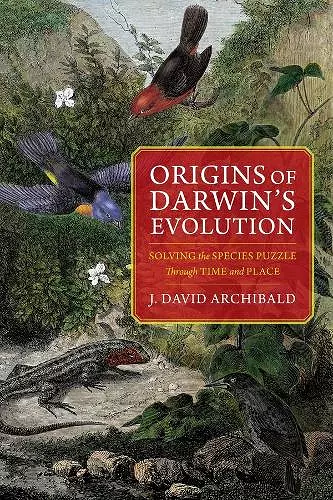Origins of Darwin's Evolution
Solving the Species Puzzle Through Time and Place
Format:Paperback
Publisher:Columbia University Press
Published:11th Feb '20
Currently unavailable, and unfortunately no date known when it will be back

Historical biogeography—the study of the history of species through both time and place—first convinced Charles Darwin of evolution. This field was so important to Darwin’s initial theories and line of thinking that he said as much in the very first paragraph of On the Origin of Species (1859) and later in his autobiography. His methods included collecting mammalian fossils in South America clearly related to living forms, tracing the geographical distributions of living species across South America, and sampling peculiar fauna of the geologically young Galápagos Archipelago that showed evident affinities to South American forms. Over the years, Darwin collected other evidence in support of evolution, but his historical biogeographical arguments remained paramount, so much so that he devotes three full chapters to this topic in On the Origin of Species.
Discussions of Darwin’s landmark book too often give scant attention to this wealth of evidence, and we still do not fully appreciate its significance in Darwin’s thinking. In Origins of Darwin’s Evolution, J. David Archibald explores this lapse, showing how Darwin first came to the conclusion that, instead of various centers of creation, species had evolved in different regions throughout the world. He also shows that Darwin’s other early passion—geology—proved a more elusive corroboration of evolution. On the Origin of Species has only one chapter dedicated to the rock and fossil record, as it then appeared too incomplete for Darwin’s evidentiary standards. Carefully retracing Darwin’s gathering of evidence and the evolution of his thinking, Origins of Darwin’s Evolution achieves a new understanding of how Darwin crafted his transformative theory.
Charles Darwin begins The Origin of Species by saying that while on HMS Beagle he was struck by two classes of facts: the strange distributions of plants and animals on Earth, and the progression of forms in the fossil record from the oldest rocks to the youngest. These, and not variations in populations, first led him to doubt theories of special creation and the fixity of species. In this book, J. David Archibald shows how the facts of paleontology and biogeography led Darwin to suspect that organisms changed through time, and eventually to develop the central theory of all of biology. A very nice read that will open the perspectives of a great number of readers. -- Kevin Padian, Museum of Paleontology, University of California, Berkeley
This is a fresh and stimulating reevaluation of the nature of Darwin’s argumentation behind his theory of evolution through natural selection. Particularly important is the focus on the evidence Darwin himself thought most important: the geographical distribution of organisms around the globe. This is a book that should be read both by Darwin scholars and by today’s practicing evolutionists. -- Michael Ruse, author of Defining Darwin: Essays on the History and Philosophy of Evolutionary Biology
In this thoughtful and carefully researched book, Archibald makes it abundantly clear that it was biogeography, not geology or the fossil record, that provided Darwin and his supporters with the earliest compelling evidence for evolution. Origins of Darwin’s Evolution fills a significant gap in the literature on Darwin’s research methods and the birth of the modern theory of evolution. -- Michael Ghiselin, author of The Triumph of the Darwinian Method
[In Archibald's book,] Darwin’s argumentative structure is illuminated, his process in developing the theory is detailed, and the otherwise difficult to interpret roles and relationships of his South American finds become beautifully clear. -- Charles H. Pence, Louisiana State University * The Quarterly Review of Biology *
Appealing and concise. * Isis *
This carefully researched book will appeal to both naturalists and historians of science. * Choice *
A comprehensive, well-written, and accessible account of a relatively underexplored history of what Darwin believed to be the earliest major proof of evolution. The great strength of this book lies in bringing to life Darwin’s relationship with a cast of historical characters, his own intellectual development, and the observations that first lit the thought of evolution and the search to solve the species puzzle. * British Journal for the History of Science *
This is one of those seemingly modest tomes that turns out to be indispensable for the Darwin scholar—and for everyone interested in the natural history of evolution. * Systematic Biology *
ISBN: 9780231176859
Dimensions: unknown
Weight: unknown
208 pages